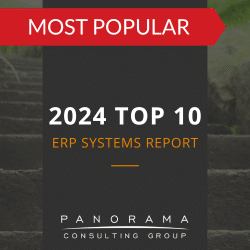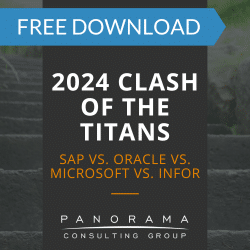As you’re considering whether you need new enterprise software, you might be weighing the benefits of sticking with your legacy systems vs. implementing a modern solution.
Instead of talking about the benefits of modern technology, today we’re talking about the benefits of legacy systems. Why are legacy systems still used? There are many reasons organizations keep them around. Whether those reasons are good enough depends on the unique situation.
What are Legacy Systems?
Put simply, legacy systems are older software models that are generally considered to be obsolete. While the system may still perform just fine, it isn’t as feature-rich as a newer model would be.
Legacy systems might rely on outdated hardware or lack important security updates. In the case of an on-premise solution, it may also lack the ability to operate in the cloud or lack an open API that allows it to interface with other systems.
The 2024 Top 10 ERP Systems Report
What vendors are considering for your ERP implementation? This list is a helpful starting point.
Why are Legacy Systems Still Used?
While your first inclination might be to replace your legacy solutions as soon as something newer and better comes along, there can be value in retaining them. Let’s look at a few reasons why this could be the case.
1. Your Employees May Not Embrace the Change
To an outsider, your legacy system might look outdated. They may urge you to upgrade, explaining that new, automated platforms are much easier to use.
Yet, here’s the problem: Your employees have already been using this system for years, maybe even decades. They’ve grown accustomed to all its functions, and they’re even familiar with its quirks and issues. If you ask them to embrace a new solution, you could encounter some significant resistance.
Of course you could employ organizational change management to transition your workforce, but it isn’t always easy. End-users generally prefer to stick with what they know.
2. Digital Transformation Can be Expensive
It’s no secret that upgrading your legacy IT systems isn’t an inexpensive process. First, you have the cost of the new software itself. Then, there’s the cost of training your employees on the new solution.
In addition, there could be other costs to consider, including:
- Business process management
- Backfilling of internal resources
- Data migration
While not making the switch can also be costly, you may decide to retain your legacy systems if it simply isn’t in the budget to do otherwise.
3. Your Legacy IT Systems Still Fulfill a Need
If you still rely on a mission-critical legacy system to fulfill a core business need, you may want to think twice about replacing it. You might not be able to afford the downtime as you move from one system to the next. This applies to both out-of-the-box systems and customized ones.
If your teams continue to successfully use existing software to drive sales, delight customers, and complete their in-house tasks, then you may need to reconsider what’s driving you to upgrade in the first place.
4. Your Team Lacks the IT Skills Required for a Migration
For large enterprises with a robust IT team, implementing a new ERP system may not seem intimidating. You have the budget, resources, and technical expertise required to complete the job.
However, if you’re a small-to-midsized company, you might lack the money, time, and skills required to make the transition. You could hire a third-party consultant, but you’re hesitant to let go of the reins.
This is an example of a bad reason for keeping your legacy systems. ERP consultants aren’t the monsters many organizations make them out to be. As long as you hire the right consulting team, you needn’t worry about excessive costs or secret ties with ERP vendors resulting in software selection bias.
5. Data Migration Can be Challenging
Your legacy systems contain an enormous amount of data accumulated over the course of several years. Moving all this information to a new system isn’t easy. This is especially the case if there’s no clear way to integrate your existing tools with the new ones.
Think about a customer relationship management (CRM) system, for instance. If you have one, it’s likely filled with all kinds of valuable information about your customers and their accounts. If your team decides to update to a more modern CRM solution, you’ll be tasked with moving all that information from the legacy system to the new platform.
Most companies don’t want this headache, nor the data migration costs, so they choose to retain their current systems.
6. You Haven’t Recovered Your Initial Investment Yet
Finally, one of the reasons companies tend to favor legacy systems over new technology is that they’re still waiting to recover the investments they made years ago. Any time you deploy an IT system, it’s expensive, and you must use it for a certain amount of time before the value outweighs the costs.
Should You Replace or Retain Your Legacy Systems?
Why are legacy systems still used? Despite how exciting and sophisticated new software might seem, many organizations have good reasons to retain the solutions they already have.
However, before moving forward with this decision, take the time to discuss these points with your project team. Then, decide whether it makes good business sense to keep your existing systems.
You should also discuss your strategy with a third-party ERP implementation consultant. Contact us below to start the conversation.






![Why are Legacy Systems Still Used? [Good Reasons & Bad Reasons]](https://www.panorama-consulting.com/wp-content/uploads/2023/02/why-are-legacy-systems-still-used.png)







